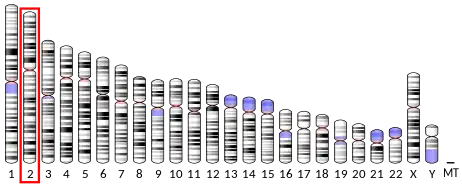| PJVK | |||||||||||||||||||||||||||||||||||||||||||||||||||
|---|---|---|---|---|---|---|---|---|---|---|---|---|---|---|---|---|---|---|---|---|---|---|---|---|---|---|---|---|---|---|---|---|---|---|---|---|---|---|---|---|---|---|---|---|---|---|---|---|---|---|---|
| Identifiers | |||||||||||||||||||||||||||||||||||||||||||||||||||
| Aliases | PJVK, DFNB59, deafness, autosomal recessive 59, pejvakin | ||||||||||||||||||||||||||||||||||||||||||||||||||
| External IDs | OMIM: 610219 MGI: 2685847 HomoloGene: 19773 GeneCards: PJVK | ||||||||||||||||||||||||||||||||||||||||||||||||||
| |||||||||||||||||||||||||||||||||||||||||||||||||||
| |||||||||||||||||||||||||||||||||||||||||||||||||||
| |||||||||||||||||||||||||||||||||||||||||||||||||||
| |||||||||||||||||||||||||||||||||||||||||||||||||||
| Wikidata | |||||||||||||||||||||||||||||||||||||||||||||||||||
| |||||||||||||||||||||||||||||||||||||||||||||||||||
Pejvakin is a protein that in humans is encoded by the PJVK gene. [5]
Function
The protein encoded by this gene is a member of the gasdermin family, a family which is found only in vertebrates. The encoded protein is required for the proper function of auditory pathway neurons. Defects in this gene are a cause of non-syndromic sensorineural deafness autosomal recessive type 59 (DFNB59). [provided by RefSeq, Dec 2008].
References
- 1 2 3 GRCh38: Ensembl release 89: ENSG00000204311 - Ensembl, May 2017
- 1 2 3 GRCm38: Ensembl release 89: ENSMUSG00000075267 - Ensembl, May 2017
- ↑ "Human PubMed Reference:". National Center for Biotechnology Information, U.S. National Library of Medicine.
- ↑ "Mouse PubMed Reference:". National Center for Biotechnology Information, U.S. National Library of Medicine.
- ↑ "Entrez Gene: Pejvakin". Retrieved 2020-05-18.
Further reading
- Delmaghani S, del Castillo FJ, Michel V, Leibovici M, Aghaie A, Ron U, Van Laer L, Ben-Tal N, Van Camp G, Weil D, Langa F, Lathrop M, Avan P, Petit C (July 2006). "Mutations in the gene encoding pejvakin, a newly identified protein of the afferent auditory pathway, cause DFNB59 auditory neuropathy". Nat. Genet. 38 (7): 770–8. doi:10.1038/ng1829. PMID 16804542. S2CID 2443891.
- Ebermann I, Walger M, Scholl HP, Charbel Issa P, Lüke C, Nürnberg G, Lang-Roth R, Becker C, Nürnberg P, Bolz HJ (June 2007). "Truncating mutation of the DFNB59 gene causes cochlear hearing impairment and central vestibular dysfunction". Hum. Mutat. 28 (6): 571–7. doi:10.1002/humu.20478. PMID 17301963. S2CID 23186967.
- Collin RW, Kalay E, Oostrik J, Caylan R, Wollnik B, Arslan S, den Hollander AI, Birinci Y, Lichtner P, Strom TM, Toraman B, Hoefsloot LH, Cremers CW, Brunner HG, Cremers FP, Karaguzel A, Kremer H (July 2007). "Involvement of DFNB59 mutations in autosomal recessive nonsyndromic hearing impairment". Hum. Mutat. 28 (7): 718–23. doi:10.1002/humu.20510. PMID 17373699. S2CID 37864188.
- Hashemzadeh Chaleshtori M, Simpson MA, Farrokhi E, Dolati M, Hoghooghi Rad L, Amani Geshnigani S, Crosby AH (September 2007). "Novel mutations in the pejvakin gene are associated with autosomal recessive non-syndromic hearing loss in Iranian families". Clin. Genet. 72 (3): 261–3. doi:10.1111/j.1399-0004.2007.00852.x. PMID 17718865. S2CID 12661287.
- Xu S, Chen Z, Lu Y, Wei Q, Cao X, Xing G, Bu X (October 2008). "[Sequence analysis of DFNB59 gene in a Chinese family with dominantly inherited auditory neuropathy]". Lin Chung Er Bi Yan Hou Tou Jing Wai Ke Za Zhi (in Chinese). 22 (19): 880–2. PMID 19160860.
- Talmud PJ, Drenos F, Shah S, Shah T, Palmen J, Verzilli C, Gaunt TR, Pallas J, Lovering R, Li K, Casas JP, Sofat R, Kumari M, Rodriguez S, Johnson T, Newhouse SJ, Dominiczak A, Samani NJ, Caulfield M, Sever P, Stanton A, Shields DC, Padmanabhan S, Melander O, Hastie C, Delles C, Ebrahim S, Marmot MG, Smith GD, Lawlor DA, Munroe PB, Day IN, Kivimaki M, Whittaker J, Humphries SE, Hingorani AD (November 2009). "Gene-centric association signals for lipids and apolipoproteins identified via the HumanCVD BeadChip". Am. J. Hum. Genet. 85 (5): 628–42. doi:10.1016/j.ajhg.2009.10.014. PMC 2775832. PMID 19913121.
- Bailey SD, Xie C, Do R, Montpetit A, Diaz R, Mohan V, Keavney B, Yusuf S, Gerstein HC, Engert JC, Anand S (October 2010). "Variation at the NFATC2 locus increases the risk of thiazolidinedione-induced edema in the Diabetes REduction Assessment with ramipril and rosiglitazone Medication (DREAM) study". Diabetes Care. 33 (10): 2250–3. doi:10.2337/dc10-0452. PMC 2945168. PMID 20628086.
- Mahdieh N, Rabbani B, Wiley S, Akbari MT, Zeinali S (October 2010). "Genetic causes of nonsyndromic hearing loss in Iran in comparison with other populations". J. Hum. Genet. 55 (10): 639–48. doi:10.1038/jhg.2010.96. PMID 20739942.
- Borck G, Rainshtein L, Hellman-Aharony S, Volk AE, Friedrich K, Taub E, Magal N, Kanaan M, Kubisch C, Shohat M, Basel-Vanagaite L (September 2012). "High frequency of autosomal-recessive DFNB59 hearing loss in an isolated Arab population in Israel". Clin. Genet. 82 (3): 271–6. doi:10.1111/j.1399-0004.2011.01741.x. PMID 21696384. S2CID 7014274.
This article incorporates text from the United States National Library of Medicine, which is in the public domain.
This article is issued from Wikipedia. The text is licensed under Creative Commons - Attribution - Sharealike. Additional terms may apply for the media files.



